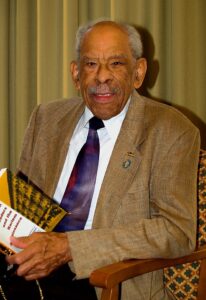W. Burghardt Turner




Wyatt Burghardt Turner (1915-2009) was a teacher at Patchogue-Medford High School, an educator at Stony Brook University, and an important and impactful Long Island civil rights and community leader for more than five decades. A true Long Islander, Mr. Turner was born and lived in Jamaica, Queens, for 40 years, and in Patchogue for another 40. His parents, Frank and Frosty Turner, had left Richmond, Kentucky to establish a home in Jamaica so Frank could work for the National Association for the Advancement of Colored People (NAACP). Frank named his son after his close associate, the historian Dr. W. E. Burghardt Du Bois, with whom Frank worked to establish the NAACP office in 1910.
W. Burghardt Turner, as he identified himself, attended high school and college back in Kentucky in order to care for his grandmother. He graduated cum laude with a BA in history and sociology from Kentucky State College in 1939 and returned to New York to pursue graduate degrees at Columbia University. In 1942 he married Joyce Moore, who was also a graduate student at Columbia. During World War II he was drafted into the Army. He served in the 92nd Division, and as an engineer in a truck company in Italy. He utilized the GI Bill to complete his MA degree in history and work on a PhD.
With his impressive educational credentials, Mr. Turner went to work as a teacher at a New York City junior high school, and then accepted a job as an archivist for the Navy Department in Pennsylvania, only to discover that decent housing was not available for African Americans. In 1952, a job as claims examiner in the Social Security Administration office in Patchogue provided an opportunity for Turner to move his family back to Long Island. Unfortunately, the Turners found that discrimination in housing also existed on Long Island. In order to buy a house they liked on Maple Avenue, Mr. Turner had to ask a friend to make the purchase and then resell the house to him. A local bank cooperated with the plan by agreeing to provide a mortgage on the house. In 1954, Turner family life began in Patchogue where his three children Mitchell, Sylvia and Richard would attend school.
Patchogue in the 1950s and ’60s was a community with many residents who were respectful toward African Americans, and in time the Turner family was involved in activities such as Little League, the Boy Scouts, the Parent Teacher Association at Medford Avenue School, and the establishment of the Unitarian Fellowship in Bellport. Turner was honored as “Man of the Year” by Temple Beth-El in 1962, and his wife as “Mother of the Year” by the Spanish Society of Suffolk County in 1974. Richard Turner was elected president of his senior class.
Most importantly, in 1957 the Patchogue-Medford Superintendent of Schools, Dr. Alden T. Stuart, who had previously turned down an application from Turner, offered him a position as teacher of social studies at the high school. Turner is believed to have been the first African American hired to teach in the district. He was a popular teacher at PMHS, and actively represented teachers in their negotiations with the Board of Education. Later a Board member described how effective and professional Turner had been in discussions that led to increased wages and health benefits for all teachers.
Not only did Turner enjoy teaching high school, he taught courses in history and sociology at Southampton College, served as associate director of the NEA Institute on School Integration at Southampton College, and as national director of the NEA Project on Civil Rights. Later in his career he authored research articles in professional journals and books on accomplishments of unrecognized African Americans.
Turner’s family background led not only to his choice of profession but also to his strong motivation to help change the discrimination laws and practices so abhorrent and systemic in our society. In 1962 he organized the Patchogue Branch of the NAACP which later became the Brookhaven Town NAACP. The organization responded to complaints of discrimination and initiated discussions that led to job programs for minorities with three major county employers: Long Island Lighting Company, Brookhaven National Laboratory, and Stony Brook University. Turner also served as chairperson of the Suffolk County Human Rights Commission and the Economic Opportunity Council of Suffolk County.
Turner’s leadership as president of the local NAACP led indirectly to his appointment at Stony Brook University. The chair of the Department of History was a member of the chapter, and learned that Turner had the qualifications for an open position at the University on how to teach history. Turner hesitated because the salary was lower, but he joined the faculty at Stony Brook in 1968. In addition to the methods course, he introduced courses on African American history and Native American history. In 1969, Stony Brook President John Toll established the University Equal Employment Opportunity Committee and appointed Turner chairman. Turner’s tenure as assistant professor came to a sad end in 1979 with the loss of his vision.
There were two events at Stony Brook that gave him pleasure and fulfillment following retirement. In 1987 the New York State Legislature established the Underrepresented Graduate Fellowship Program to support completion of graduate studies at the four state universities. The program at Stony Brook was named in his honor: The W. Burghardt Turner Fellowship. In 2007 Stony Brook granted him an honorary degree, Doctor of Humane Letters. He considered those honors to be an appreciation and affirmation of his joint efforts as an educator and a community activist.
